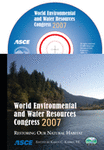Thyroid Receptor-Mediated Transcriptional Activity in Environmentally Relevant Wastewater
Publication: World Environmental and Water Resources Congress 2007: Restoring Our Natural Habitat
Abstract
Wastewater reclamation and reuse is imperative in water-starved areas such as the southwestern United States. In the Tucson Active Management Area, a geographic region defined for the purpose of groundwater management, the total demand for water already exceeds the available water supply, which consists of renewable ground water and the regional entitlement to Central Arizona Project water. Thus, the regional demand cannot be satisfied without resorting to groundwater mining unless water is reclaimed for local beneficial use. Less certain are the acceptable uses for reclaimed water and the nature of use-dependent treatments or water quality requirements that will protect human and ecological health. Disruption of thyroid-mediated actions is among the possible risks from chronic exposure to environmental contaminants. Although numerous Pharmaceuticals and personal care products have been detected in surface waters of the United States that are influenced by wastewater effluent, only a few such compounds are present at concentrations that produce recognizable adverse effects in the environment. Endocrine disrupting compounds (EDCs) are generally of greater concern in this context than other trace contaminants because of the very low concentrations at which hormones induce physiological responses. Anthropogenic chemicals can disrupt nuclear thyroid hormone signaling without affecting circulating levels of thyroid hormone. Accordingly, we sought to develop a sensitive nuclear-based assay system in order to evaluate environmental samples. The use of a Luciferase-based reporter assay is commonly used to detect transcriptional activity. We evaluated a luciferase-reporter construct and the human thyroid receptor β (TR-β) construct for sensitivity in the human hepatoma cell line, (Hep G2). The transfected cells were exposed to T3 at concentrations in the range 10-6 to 10-11M in order to establish a lower thyroid hormone detection limit and EC50 for the new bioassay procedure. The assay was then applied to environmental samples containing organics concentrated from final effluent derived from a conventional secondary wastewater treatment plant. The effluent samples activated thyroid receptor-mediated transcription.
Get full access to this chapter
View all available purchase options and get full access to this chapter.
Information & Authors
Information
Published In
Copyright
© 2007 American Society of Civil Engineers.
History
Published online: Apr 26, 2012
Authors
Metrics & Citations
Metrics
Citations
Download citation
If you have the appropriate software installed, you can download article citation data to the citation manager of your choice. Simply select your manager software from the list below and click Download.
